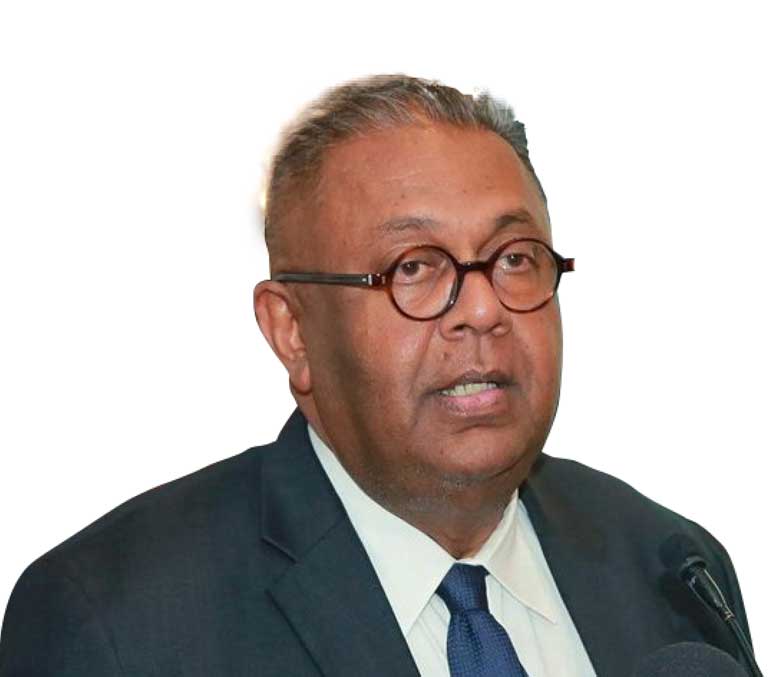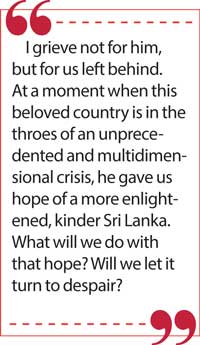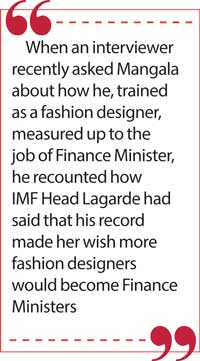Monday Feb 16, 2026
Monday Feb 16, 2026
Thursday, 26 August 2021 00:00 - - {{hitsCtrl.values.hits}}

 A big tree has fallen. What are the consequences?
A big tree has fallen. What are the consequences?
Mangala went out on a high. A month ago, on 25 July, he had that news conference at Freedom Hub, surrounded by young people. On that day and in the subsequent media interviews, he said what he believed and felt, without compromise.
Back in 2020, when he was contemplating withdrawing from the contesting the General Election, I recall telling him the cameras will not be there for one who is not in politics. He disagreed, saying that he would be in politics, just not electoral politics. The media attention that he drew following the launch of the Radical Centre proved he was right, and I was wrong.
I worked closely with him on telecom reforms and on managing the civil conflict back in 1998-’99. Politics is the art of the possible. He was a practical politician. A doer.
As a liberal, he was in the minority in all the Cabinets served in and in all the political parties he worked in. That required compromise. But his compromises went only so far. Beyond a point, he did not yield. In these last months he spoke freely, without worrying about how the President or Prime Minister or the majority of the party leadership would perceive his comments. That would have been liberating.
Many associate Mangala with peace, with the Sudu Nelum Vyapaaraya. He was consistently for the rights of the Tamils and against majoritarian thinking, but he was also the Foreign Minister who persuaded Canada and the European Union to designate the LTTE a terrorist organisation.
 He would always say that he built on the work of the late Lakshman Kadiragamar. But it was he who closed the deal. These effective counter measures against the obdurate LTTE were made possible by the continuity he represented with the genuine peace building efforts of President Kumaratunga.
He would always say that he built on the work of the late Lakshman Kadiragamar. But it was he who closed the deal. These effective counter measures against the obdurate LTTE were made possible by the continuity he represented with the genuine peace building efforts of President Kumaratunga.
More than 20 years later, the telecom reforms that he led are still talked about by those who remember the bad old days as the most successful. We who lived through that knew how rough the going was. He was steadfast and while he lost some friends along the way, he did not abandon the reformers. His regret was that we had not built on the telecom success and the SAGT and SriLankan PPPs of the late 1990s.
Just yesterday, an official who worked in the UDA during Mangala’s short tenure there, called me to ask how he was doing and to wish him recovery. Many remember how leaders of his own party turned on him when he went after scofflaws. But my friend spoke of the many structural improvements that he put in place.
As Minister of Finance, his team achieved a surplus in the primary balance after 63 years. Having State revenue greater than state expenditure minus the interest payment is known as the surplus in primary balance. Its relevance is even greater today than then.
The budget speeches he presented made overall sense and were consistent with national policy. Though disrupted by the 52-day coup, initiatives such as Enterprise Sri Lanka had major potential and benefited those it touched.
 When an interviewer recently asked him about how he, trained as a fashion designer, measured up to the job of Finance Minister, he recounted how IMF Head Lagarde had said that his record made her wish more fashion designers would become Finance Ministers.
When an interviewer recently asked him about how he, trained as a fashion designer, measured up to the job of Finance Minister, he recounted how IMF Head Lagarde had said that his record made her wish more fashion designers would become Finance Ministers.
He went on to say he knew little about telecom other than how to dial a call when given the portfolio, but that he had a good team, and that was the same at Finance. His ability to pick the right people (and even to work with the people he was given) and to motivate them (and back them up) was key to his style of work, not only in government, but in all things.
Mangala’s loss is best represented to me by a Facebook post by one of the young people he worked with closely these past months. It was a picture of a black hole, a void. That is a truer statement than all the words I can put together. I grieve not for him, but for us left behind. At a moment when this beloved country is in the throes of an unprecedented and multidimensional crisis, he gave us hope of a more enlightened, kinder Sri Lanka.
What will we do with that hope? Will we let it turn to despair?